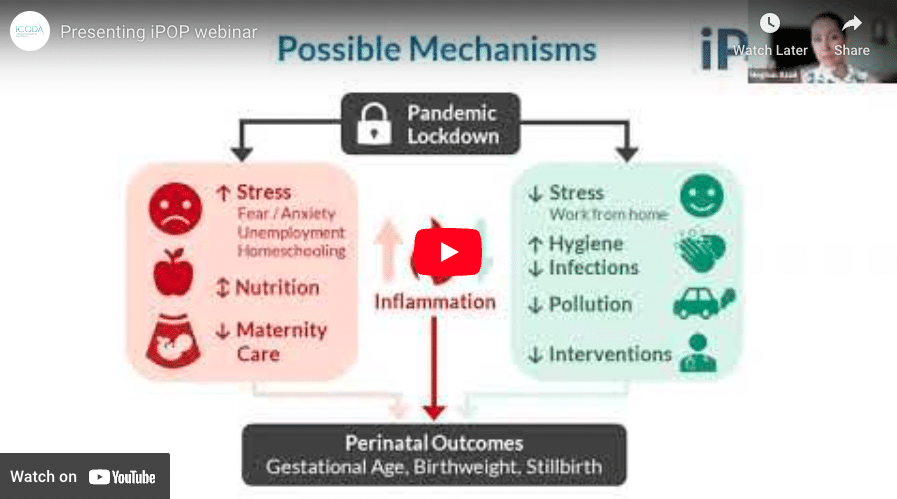Driver project 2
The International Perinatal Outcomes in the Pandemic (iPOP) Study, a study exploring the impact of the pandemic lockdown on preterm births worldwide, including variances across countries.
Preterm birth is the leading cause of infant death worldwide, but its causes are largely unknown. During the early COVID-19 lockdowns, dramatic reductions in preterm births (up to 90% in Denmark) and very low birth weight (70% in Ireland) were reported.
Lockdowns have dramatically impacted maternal workload, access to healthcare, hygiene practices, and air pollution – all of which could impact preterm birth rates and might affect pregnant women differently in different regions of the world.
The iPOP Study examined these trends globally as the pandemic continued, to understand the underlying cause(s).
What were its aims?
The global iPOP study aimed to investigate the impact of pandemic lockdowns on preterm birth and stillbirth, and assess the underlying causative factors.
The study asked:
- Is this (really) happening everywhere? – We will assess preterm birth and stillbirth rates around the world to determine if changes during the pandemic lockdown are real and consistent globally, or show regional variation.
- What is the reason? – We will determine if regional changes in preterm birth or stillbirth during lockdown are related to regional differences in the stringency or type of lockdown measures, maternity leave policies, maternity care practices, or air pollution.
- Are all pregnancies affected? – We will explore whether these relationships depend on a mother’s age, race, socioeconomic status, healthcare usage, pre-existing health conditions or pregnancy complications.
Whether the pandemic is worsening or unexpectedly improving newborn health, our research aimed to provide critical new information to shape prenatal care strategies throughout (and well beyond) the pandemic.
Where are we now?
The iPOP Study involved over 100 researchers in more than 40 countries, including 21 lower- and middle- income countries (LMICs), with access to data on 52m births. The team working on the study included obstetricians, neonatologists, epidemiologists, public health researchers, environmental scientists and policymakers.
Together, they leveraged the most disruptive and widespread changes of our lifetime (the COVID-19 pandemic) to make rapid discoveries about preterm birth.
The study protocol is available online via Wellcome Open Research: The international Perinatal Outcomes in the Pandemic (iPOP) study: protocol.
The main study publication is available via Nature Human Behaviour: Changes in preterm birth and stillbirth during COVID-19 lockdowns in 26 countries.
Driver project 2 -
| Title | Journal | Date |
Type | Abstract |
|---|---|---|---|---|
| International Journal of Medical Informatics | Dec-24 | Publication | To set out the methodology used by ICODA in developing a rapid prototype to support secure, federated methods for the access and analysis of sensitive health data. | |
|
Changes in preterm birth and stillbirth during COVID-19 lockdowns in 26 countries
|
Nature Human Behaviour | Feb 2023 | Publication | Preterm birth (PTB) is the leading cause of infant mortality worldwide. Changes in PTB rates, ranging from −90% to +30%, were reported in many countries following early COVID-19 pandemic response measures (‘lockdowns’)… |
| Nature | Aug 2021 | Article | The disruption that the coronavirus has caused to daily life has created unique research opportunities for scientists | |
| Clinical and Investigative Medicine | June 2021 | Article | Meghan Azad and Nathalie Rodriguez share share their Top 10 Tips for defining and achieving success in Team Science | |
|
The international Perinatal Outcomes in the Pandemic (iPOP) study: protocol |
Wellcome Open Research | Feb 2021 | Publication | Preterm birth is the leading cause of infant death worldwide, but the causes of preterm birth are largely unknown… |
| The Lancet | Oct 2020 | Article | As co leads of the new international Perinatal Outcomes in the Pandemic (iPOP) Consortium, we are delighted that the Lancet Small Vulnerable Newborn Series1 will focus crosssector attention on the high burden of baby deaths (encompassing miscarriage, stillbirth, and neonatal mortality) and disability (following preterm birth and low birthweight), which remain largely intractable with current siloed approaches… |
| Title | Type | Description |
| International Perinatal Outcomes in the Pandemic (iPOP) study, multi-country | Metadata |
Data from the International Perinatal Outcomes in the Pandemic (iPOP) study (https://ipopstudy.com). The iPOP study is investigating the impact of pandemic lockdowns on preterm birth and stillbirth rates.
|
| Title |
Description |
|
| Watch: ICODA webinar series: Presenting iPOP | Hear Meghan Azad, Natalie Rodriguez, Merilee Brockway and David Burgner, co-leads of the International Perinatal Outcomes in the Pandemic (iPOP) Study, supported by HDR UK, talk about the work of the iPOP team over the last 2 years. The iPOP study explored the impact of the pandemic lockdown on preterm births worldwide, including variances across countries. | 
|


